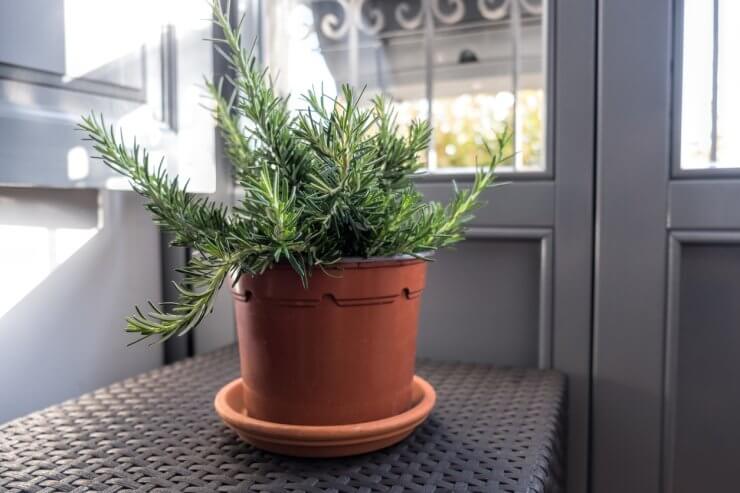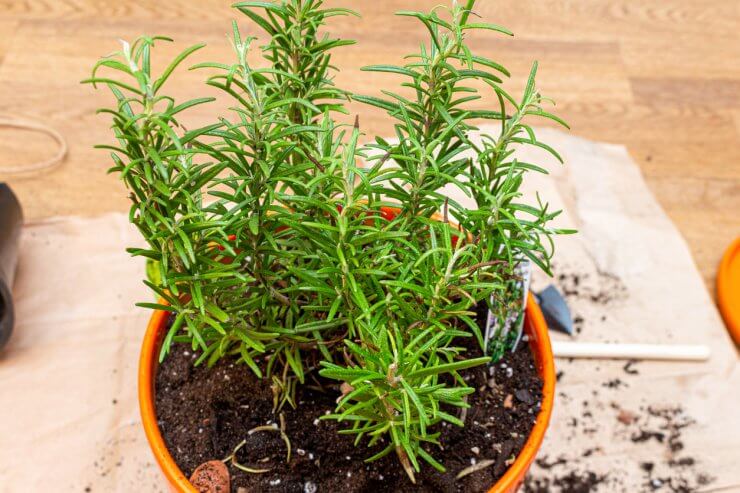
I love rosemary. It’s easy to grow. It’s hardy. And it tastes great in so many dishes. But I also regularly end up with powdery mildew on rosemary plants – especially when I bring them indoors.
Even though this seems to happen more frequently indoors, it’s not unheard of to end up with powdery mildew on rosemary plants outside, either. While powdery mildew won’t usually kill a rosemary plant, it can substantially weaken it.
However, this is a relatively easy condition to deal with. Here are several natural solutions.

7 Natural solutions for treating and preventing powdery mildew on rosemary plants
The Missouri Botanical Garden explains that powdery mildew can come from several different species of fungi. The mildew gives plant leaves a dusty, silvery appearance and can interrupt photosynthesis. They also emphasize the fact that if you do notice powdery mildew on any plants, isolate the plant right away, so the mildew doesn’t spread.
As you can imagine, the best way to deal with powdery mildew on rosemary is to prevent it in the first place. Here are some ways you can do that.
1. Circulate air. Air circulation happens naturally outdoors unless your plants are too close together. Indoors, an open window or small fan can help keep the air moving, so the fungus isn’t able to establish itself on the rosemary leaves.
2. Keep your plants healthy. Just like it’s more difficult for cold and flu viruses to impact healthy humans, healthy plants are also less susceptible to diseases.
3. Keep leaves dry. Damp conditions are ideal for fungi, therefore, one way to prevent powdery mildew on rosemary and other plants is to keep the leaves dry. This is helpful for both indoor and outdoor plants, as is the next tip.
4. Keep your rosemary in a sunny spot. Rosemary likes plenty of sunshine. Fungi do not. While this is easier to achieve with outdoor plants, a sunny windowsill can help your indoor rosemary plants, too.
5. Ensure it has the right soil. As a native of the Mediterranean, rosemary does best in looser, drier soil.
As with any plant disease, prevention is ideal. However, if you find a case of powdery mildew on rosemary plants, here are some additional steps you can take.
6. Baking soda solution. Is there anything baking soda can’t do? In all seriousness, though, baking soda is a perfectly natural treatment for powdery mildew. Mix 3 tablespoons of baking soda, one tablespoon of vegetable oil, and a few drops of dish soap into one gallon of warm water. Spray both the rosemary and the soil in case there is any fungus hiding out there. One thing to note, however, is that the residue from this baking soda mixture can look similar to powdery mildew.
7. Neem oil. This is our go-to for so many plant pests and diseases, both indoor and out. Two tablespoons of neem oil and a few drops of dish detergent mixed into a gallon of water should do the trick.
Bonus Treatment: Milk. Okay, I haven’t used this approach to treating powdery mildew on rosemary or any other herbs, so I can’t vouch for it. However, this solution seems to be making the rounds in gardening circles. If it’s on the internet, it must be true, right? I’ve seen recommendations for mixtures of 1 part milk to 2 parts water, 1 part milk to 5 parts water, and 1 part milk to 9 parts water, so do what you will with that.
Have you had to deal with powdery mildew? What was your solution?


 Previous
Previous


Can anyone help me? We are working on a rosemary border (Florida, zone 10a) with 10 plants covering 14′. I’ve grown rosemary for years but after 1 year with these, 1 plant at a time starts dying. It started last year – 1 stem, then after a month another. Today I noticed 2 more plants starting to have 1 yellowed stem each. They are 14′ apart. I have NOT overwatered or over fertilized my rosemary, and they have NO bugs, insects or powdery mildew.
Thank you in advance for any help at all.
Elaine
lovely aromatherapy